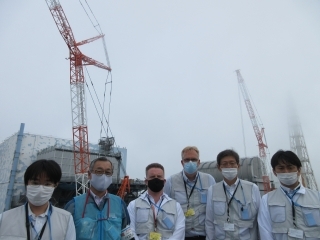Japanese Government (MEXT) Postgraduate Scholarships
2022/10/18
Kevin McMahon
Japanese Government (MEXT) Postgraduate Scholarship
Research student in Economics at Nanzan University 1997 – 1999
 With Andy White (Vice President, Decommissioning Jacobs Clean Energy, 4th from left) and Tepco managers at Fukushima Daiichi Nuclear Plant
With Andy White (Vice President, Decommissioning Jacobs Clean Energy, 4th from left) and Tepco managers at Fukushima Daiichi Nuclear Plant
I received the postgraduate Monbusho Scholarship from 1997-1999 and carried out my research at Nanzan University in Nagoya. I had previously studied on the undergraduate language program at Nanzan. My area of research was “Japan’s economic relationship with North Korea”. I was fascinated by the Soviet era communist regimes and the question of why they failed so catastrophically.
My underlying interest was and remains the question: what makes a successful system or organization? What factors determine the success or failure of an organization in achieving its own goals and in relation to others? Consideration of these questions has informed and influenced all my work in Japan and overseas ever since.
Following my postgraduate studies, I worked for 3 years on the JET program as a Coordinator for International Relations in the Kencho (prefectural office) in Fukuoka Prefecture. This experience while at times very difficult gave me very valuable insight into the workings of the Japanese government.
Following a career path that encompassed Business Analyst, Supply Chain Manager, Project/Recovery Manager, with most of this work in the Japanese aerospace industry, and another postgraduate degree (MSc Logistics and Supply Chain Management) I began working as a Project Manager for Jacobs Clean Energy in 2021. Jacobs is playing a key role in the decommissioning and decontamination projects of Fukushima Daiichi, the nuclear power plant that was devastated by the 2011 Tohoku Tsunami. I feel very proud to be involved in the massive effort to solve the problems at Fukushima Daiichi. The work is incredibly challenging, as the underlying problem is unprecedented in its scale and complexity, however I feel this is my opportunity to repay Japan for what it has done for me over the years. The scholarship was a key factor in coming to understand Japan as I do, and I use this knowledge every day in my current role.
The work is a truly massive challenge requiring the Japanese companies involved to evolve new capabilities to solve the various problems. The work is therefore also an opportunity for Japan to develop new technologies and management approaches that can and will be used to address decommissioning challenges around the globe.
I would strongly encourage anyone interested in Japan related complex cross-cultural management, environmental science and engineering to consider the work being done at Fukushima as an excellent topic for further in-depth study. There are undoubtedly several MSc/PhDs worth of study to be done with the strong potential that the resulting knowledge would contribute to the successful outcomes at Fukushima and beyond.
My underlying interest was and remains the question: what makes a successful system or organization? What factors determine the success or failure of an organization in achieving its own goals and in relation to others? Consideration of these questions has informed and influenced all my work in Japan and overseas ever since.
Following my postgraduate studies, I worked for 3 years on the JET program as a Coordinator for International Relations in the Kencho (prefectural office) in Fukuoka Prefecture. This experience while at times very difficult gave me very valuable insight into the workings of the Japanese government.
Following a career path that encompassed Business Analyst, Supply Chain Manager, Project/Recovery Manager, with most of this work in the Japanese aerospace industry, and another postgraduate degree (MSc Logistics and Supply Chain Management) I began working as a Project Manager for Jacobs Clean Energy in 2021. Jacobs is playing a key role in the decommissioning and decontamination projects of Fukushima Daiichi, the nuclear power plant that was devastated by the 2011 Tohoku Tsunami. I feel very proud to be involved in the massive effort to solve the problems at Fukushima Daiichi. The work is incredibly challenging, as the underlying problem is unprecedented in its scale and complexity, however I feel this is my opportunity to repay Japan for what it has done for me over the years. The scholarship was a key factor in coming to understand Japan as I do, and I use this knowledge every day in my current role.
The work is a truly massive challenge requiring the Japanese companies involved to evolve new capabilities to solve the various problems. The work is therefore also an opportunity for Japan to develop new technologies and management approaches that can and will be used to address decommissioning challenges around the globe.
I would strongly encourage anyone interested in Japan related complex cross-cultural management, environmental science and engineering to consider the work being done at Fukushima as an excellent topic for further in-depth study. There are undoubtedly several MSc/PhDs worth of study to be done with the strong potential that the resulting knowledge would contribute to the successful outcomes at Fukushima and beyond.


